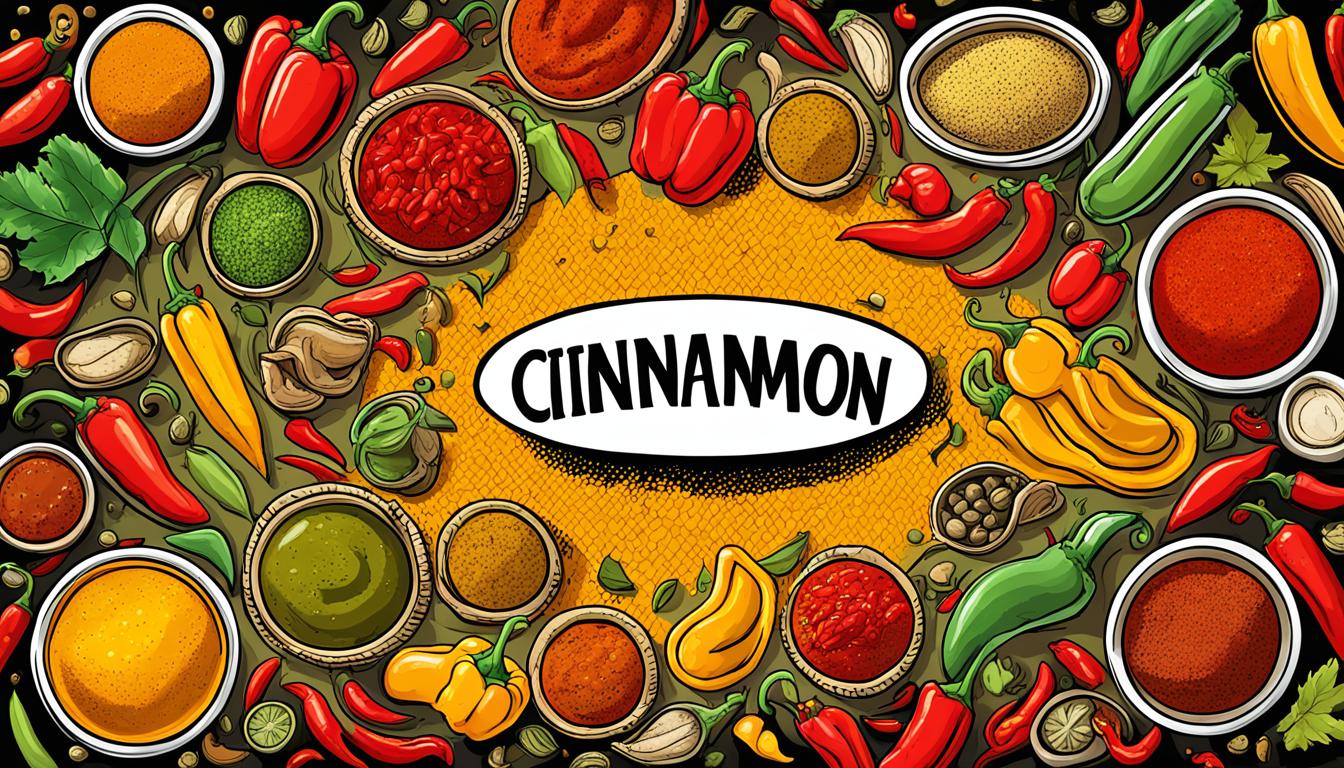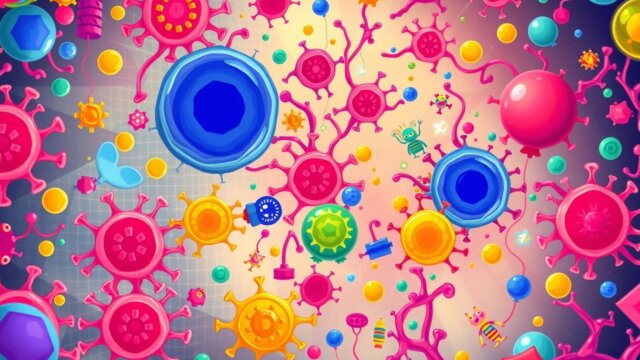FTC disclaimer: This post may contains affiliate links and we will be compensated if you click on a link and make a purchase.
A 2022 survey of 2,000 U.S. adults by the Harris Poll for Instacart found that almost three-quarters of Americans eat hot sauce with their meals. The show Hot Ones, where stars talk over spicy chicken wings, has over 58 million views.
Wendy’s now offers new items with the ghost pepper, a very spicy type. However, the “Paqui one-chip challenge” has made people think twice about spicy foods. Experts discuss the benefits and disadvantages of eating spicy foods.
Key Takeaways
- Heart disease is the leading cause of death in the United States and globally.
- Spicy foods and peppers may help improve blood pressure and lower the risk of heart disease or stroke.
- Spicy foods can significantly reduce daily salt intake, personal salt preference, and blood pressure.
- Spicy food may not prevent obesity in the long run.
- Eating a lot of capsaicin can cause uncomfortable stomach issues.
What Makes Spicy Foods Hot?
Understanding Capsaicin and the Scoville Scale
Spicy foods get their heat from a chemical called capsaicin. This chemical is in chili peppers and makes our body feel pain. It’s measured by the Scoville Scale, which goes from 0 to over 2 million Scoville Heat Units.
Capsaicin doesn’t burn our skin like heat does. It tricks our brain into feeling heat that’s not there, which gives us a special kind of pleasure.
Spicy foods are not just for fun. They helped keep food fresh and safe in hot places. Spicy foods are a big part of the culture in places like India and Mexico. People all over the world love the unique taste and heat they bring.
The Scoville Scale is the main way to measure how spicy something is. However, newer methods like liquid chromatography provide more detailed information.
Pepper Type | Scoville Heat Units (SHU) |
|---|---|
Bell Pepper | 0 SHU |
Banana Pepper | Up to 900 SHU |
Jalapeño | Up to 10,000 SHU |
Habanero | Up to 350,000 SHU |
Carolina Reaper | Up to 2,200,000 SHU |
The Good News About Spicy Foods
Spicy foods have been known for their health perks for a long time. Capsaicin, found in chili peppers, can help with pain and reduce swelling. It does this by blocking signals that send pain to the brain.
Studies also show that eating spicy foods can help keep weight down. They can boost metabolism and support a healthy gut.
A study in the Nutrition Journal in June 2023 found that spicy foods can help with high blood pressure. High blood pressure is a big health issue for many people around the world.
Chili peppers are not just hot. They are also packed with nutrients. They have few calories, fats, and carbs but are full of fiber, vitamins, and minerals. Some studies suggest eating chili peppers could even help you live longer.
We need more research to understand how spicy foods help our health, but the current evidence is promising. Adding spicy foods to your diet could help with pain, inflammation, weight, and gut health.
Hot Sauce | Scoville Scale Rating |
|---|---|
Tabasco Sauce | 3,500 SHU |
Louisiana Hot Sauce | 450 SHU |
Cholula Hot Sauce | 3,600 SHU |
Frank’s RedHot (Original) | 450 SHU |
Frank’s RedHot (Xtra Hot) | 2,000 SHU |
“Spicy foods may not be for everyone, but for those who can tolerate them, the potential health benefits are quite intriguing.”
Potential Heart Health Benefits
Spicy foods might be good for your heart. Studies say eating spicy dishes could lower blood pressure and cholesterol. These are big risk factors for heart disease.
A study at the University of Vermont found that people eating capsaicin had 13 percent less total death risk, including fewer deaths from heart disease and stroke.
Capsaicin, found in spicy foods, is good for your heart. A 2017 study showed people taking 4 mg capsaicin supplements twice a day for three months had lower cholesterol. Capsaicin can also help lower blood pressure and cholesterol, which cuts down heart disease risk.
But, the link between spicy foods and heart health is complex. Some studies show benefits, but a 2023 review warns high spicy food intake might raise cholesterol levels. Eating spicy food in moderation is key for your heart’s health.
“The relationship between spicy foods and heart health is not entirely clear-cut. While some studies have found benefits, a 2023 review suggests that while higher intakes of spicy foods may help lower blood pressure, it may also negatively impact cholesterol levels.”
Spicy Foods and Gut Health
Spicy foods can affect your digestive system in many ways. The main heat in spicy foods comes from capsaicin, a compound that might help balance your gut microbiome and improve your digestive health.
The Role of Capsaicin in Gut Microbiome Balance
Research says capsaicin can increase the number of good bacteria in your gut, lower bad bacteria, and reduce stomach acid, which might prevent stomach ulcers.
But spicy foods can also be hard on your stomach. They might worsen IBS symptoms, like pain, bloating, and diarrhea. They can also upset stomachs in people with dyspepsia and make IBD symptoms worse.
Potential Benefits of Spicy Foods for Gut Health | Potential Drawbacks of Spicy Foods for Gut Health |
|---|---|
|
|
It’s important to know how spicy foods affect you personally. You should think about how they make you feel before eating a lot of them.
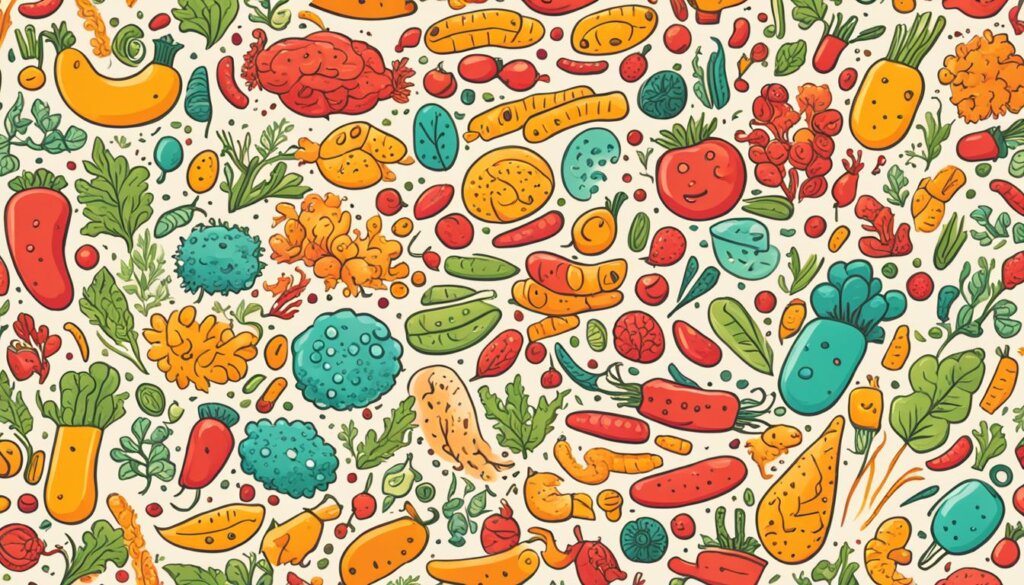
Weight Management and Spicy Foods
Spicy foods have been debated for their effect on weight. Some studies say they help with weight loss. But, others warn of a risk of gaining weight.
A large study surveyed almost 190,000 people. It found that eating a lot of spicy food was linked to a 17% higher chance of being overweight or obese. However, it also showed that spicy food might help lower blood pressure, which is good for the heart.
Spicy foods work in complex ways on weight. Capsaicin, the spicy part, can make you eat less and burn more calories. Eating capsaicin daily might help you lose weight by eating fewer calories.
Some research links eating a lot of spicy food to a higher chance of being obese. This might be because you crave sweets and carbs more. Eating very spicy foods, like the Carolina Reaper, can cause serious health problems like chest pain and damage to the esophagus.
In conclusion, spicy foods and weight management are complicated. They might help with appetite and metabolism but could also lead to weight gain and health issues. We need more studies to understand how spicy foods fit into a healthy diet and lifestyle for weight management.
Spicy Food Intake | Potential Impact |
|---|---|
Highest Category |
|
Frequent (6-7 days per week) |
|
Extremely High (Carolina Reaper Pepper) |
|
Spicy foods might help with weight management, but a balanced lifestyle is best. This includes eating well, exercising, and sleeping well.
Longevity and Spicy Foods
Spicy foods might help you live longer. Studies show that eating spicy dishes often could lower the risk of dying early.
A big study with almost half a million people in China found a link. Those eating spicy foods weekly had a 14% lower risk of dying than those eating them less often. This study also showed that eating spicy foods for seven years could lower the risk of dying from cancer, heart disease, and lung problems.
Spicy foods might be good for you because they contain a compound called capsaicin. Capsaicin is found in chili peppers and fights inflammation and oxidation. It can also protect against diseases like cancer, heart disease, and lung problems.
Spicy foods could also help your gut and metabolism, which can make you live longer. But we need more studies to prove that spicy food makes you live longer.
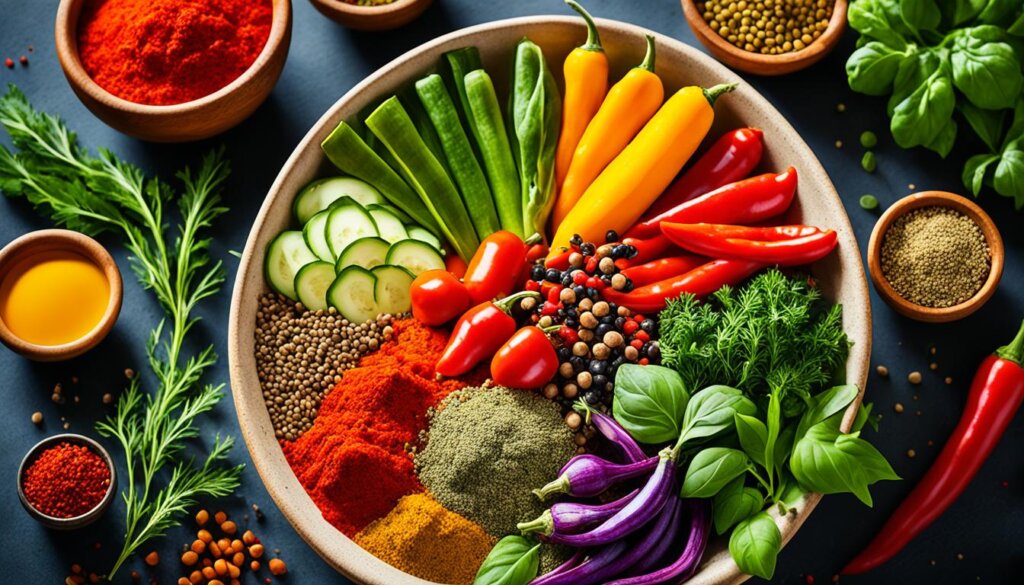
Eating spicy foods could be good for you. Studies say it might lower the risk of dying too soon. But, always talk to a doctor before changing your diet to make sure it’s right for you.
The Bad News About Spicy Foods
Spicy foods might have some health perks, but eating too much can be risky. Extremely spicy foods can cause stomach pain, burning diarrhea, chest pain, headaches, and vomiting. Capsaicin, the spicy stuff, can hurt your stomach. It can stop stomach acid production, cause inflammation, and change your gut’s lining. This might make IBS and inflammatory bowel disease worse.
Spicy foods often cause indigestion and can exacerbate GERD symptoms. For some, breathing in capsaicin can trigger an asthma attack. A study showed that eating spicy foods more than five times a week can increase stomach ulcer risk by 25%.
The National Institute of Gastroenterology found that 40% of those eating spicy foods often get heartburn weekly. Spicy foods can also irritate the skin and cause discomfort for some. It’s key to watch how your body reacts to spicy foods and eat them in small amounts to dodge these risks.
“Moderation is key when it comes to spicy foods. While they may offer some benefits, they can also trigger unpleasant and potentially harmful side effects for those with sensitivity or underlying conditions.”
Spicy Foods and Health Risks
Groups Who Should Exercise Caution
Spicy foods can be good for health, but some people should be careful. Young kids and those with health might face risks from spicy foods.
Kids have sensitive taste buds and stomachs. There’s no clear rule on how much spicy food they can have. People with asthma might have trouble breathing if they eat too much spicy stuff.
Touching spicy food can burn your skin. If spicy stuff gets in your eyes, it can hurt a lot. People with sensitive skin or eyes should be careful when eating spicy foods.
Consideration | Potential Risks |
|---|---|
Children | More sensitive palates and digestive systems; no established safe limits for capsaicin intake |
Individuals with Asthma | Bronchial constriction from high doses of capsaicin |
Skin Contact | Burning sensations from extremely spicy ingredients |
Eye Irritation | Severe pain and irritation from pepper juice or residue |

“Spicy foods can be a double-edged sword – they offer potential health benefits, but also carry risks for certain individuals. Moderation and awareness are key when incorporating them into one’s diet.”
Nutritional Value of Spicy Foods
Thanks to their ingredients and preparation, spicy foods have a wide range of nutrients. Capsaicin, found in chili peppers, is a key spice. A single raw chili pepper is low in calories but packed with nutrients like vitamin C.
Chili peppers are full of vitamins A and C, iron, and fiber. Half a cup of canned green chili peppers has just 14 calories and is low in fat. They are also high in vitamin C, which boosts the immune system.
Research shows that capsaicin in hot peppers can fight inflammation and lower heart disease risk. Spicy foods like chili peppers might help with weight loss by making you eat less and possibly boosting your metabolism.
But eating too many chili peppers can cause stomach issues like diarrhea and heartburn.
Nutrient | Quantity (per 1 tablespoon) |
|---|---|
Calories | 6 |
Water | 88% |
Protein | 0.3 grams |
Carbohydrates | 1.3 grams |
Sugar | 0.8 grams |
Fiber | 0.2 grams |
Fat | 0.1 grams |
When working with chili peppers, wear gloves to avoid skin irritation. Making chili powder involves grinding dried chilis and adding spices like oregano and cumin.
Chili peppers come in many types, each with its own heat and flavor. They are used in many dishes worldwide, from Jamaican jerk chicken to Mexican Chile relleno. Chili oil, a favorite in Asian cooking, is made by soaking dried chilies in oil.
Balancing Spicy Food Consumption
Spicy foods can be good for you, but eat them in moderation. Moderation is important when adding spicy ingredients to your meals. Adding peppers to dishes like omelets or stir-fries can be healthy and tasty. But deep-fried or heavily processed spicy foods are not as good for you and should be eaten less often.
Some hot sauces have a lot of sodium, which can be bad for people with high blood pressure. If you have digestive issues, start with small amounts of spicy food to see how you react.
To eat healthy, focus on a balanced diet and healthy preparation of spicy dishes. Try different spice levels and mix spicy foods with foods that are good for you. This makes for a well-rounded meal.
Tip | Benefit |
|---|---|
Use dairy products like milk or cheese | The casein in these foods can bind with capsaicin, reducing the sensation of spiciness. |
Incorporate high-fat foods like nuts or nut butter | The fats can help dissolve the capsaicin oils, making the spice more manageable |
Add sugar in various forms (granulated, brown sugar, honey, maple syrup) | These sweeteners can help balance out excessive spiciness |
Pair spicy dishes with carbohydrates like rice, potatoes, or bread | The carbs can help make the spice levels more manageable |
Dilute spicy dishes by adding non-spicy ingredients, water, or increasing servings | This can reduce the overall spiciness to a more enjoyable level |
Using these tips, you can enjoy spicy foods and their health benefits. This way, you keep your diet balanced and healthy.
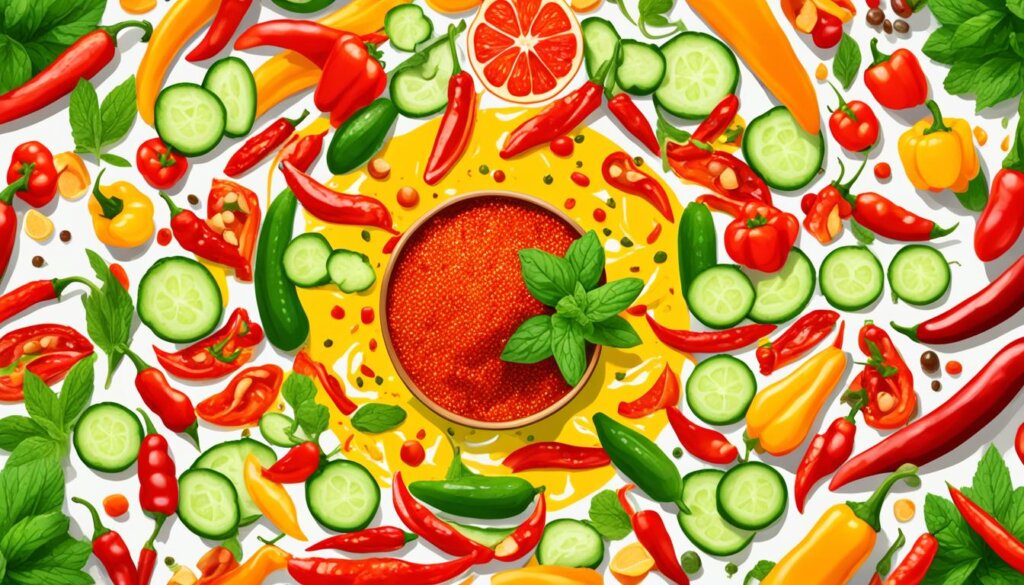
“The key to enjoying spicy foods is finding the right balance – one that tantalizes your taste buds without overwhelming your senses.”
Spicy Foods
Spicy foods are a big part of many cuisines worldwide. They add a unique and tasty flavor to dishes. From India’s fiery curries to Mexico’s zesty dishes, spicy foods have a long history.
Spicy foods get their heat from capsaicin in peppers. The Scoville Heat Units (SHU) measure this heat. The Carolina Reaper is one of the hottest peppers. Scotch bonnet peppers, Thai chiles, and piri-piri also add unique flavors and heat.
Eating spicy foods might seem scary, but they have health perks. They can help with weight, metabolism, and heart health. They also make you feel happy and less stressed.
But not everyone likes spicy foods. Some people with stomach issues should be careful. It’s key to find the right spice level for you.
Spicy foods offer many flavors, health benefits, and cultural experiences. By learning about their heat and regional specialties, you can enjoy a tasty and healthy journey.
Conclusion
Spicy foods can be good for your health in many ways. They can help your heart and gut work better. They might even help you live longer and manage your weight. But, it’s key to watch out for risks, especially if you have sensitive health issues.
Finding the right balance is important. Add spicy foods to your meals in a way that feels good for you and your health goals. By learning about the science behind spicy foods like capsaicin, you can make smart choices for your health.
Whether you choose to eat spicy foods is up to you. This article has given you the facts to help you decide. Whether you love spicy or prefer it mild, we hope you now see how these foods can benefit you.
FAQ
What makes spicy foods hot?
Spicy foods get their heat from a compound called capsaicin. This is found in chili peppers like jalapeños. Capsaicin makes your mouth and tongue feel hot but doesn’t burn your skin. The Scoville scale measures how spicy a pepper is by the capsaicin it has.
What are the potential health benefits of eating spicy foods?
Eating spicy foods can help with pain, reduce inflammation, aid in weight control, and improve gut health. Capsaicin, the spicy compound, might also lower blood pressure and cholesterol. This could lower the risk of heart disease.
Can spicy foods be bad for your health?
Eating too much spicy food can cause stomach pain, diarrhea, and heartburn. Very spicy foods can also cause asthma attacks and skin and eye irritation. Some spicy foods are high in sodium, which is bad for people with high blood pressure.
Who should be cautious when eating spicy foods?
Young kids and people with health issues like asthma or IBS should be careful with spicy foods. They might feel capsaicin’s effects more strongly and have worse reactions.
What is the nutritional value of spicy foods?
Spicy foods like chili peppers are often full of vitamins and minerals, such as vitamin C and beta-carotene. However, the spiciness usually comes from capsaicin, which isn’t very nutritious. To get all the nutrients you need, it’s best to eat spicy foods as part of a balanced diet.
How can I incorporate spicy foods into a healthy diet?
To enjoy spicy foods safely, eat them in moderation as part of a balanced diet. Add peppers to dishes like omelets or stir-fries for flavor. But avoid deep-fried or heavily processed spicy foods. These don’t offer many health benefits and should only be eaten sometimes. If you have digestive issues, start with small amounts of spicy food to see how you react.
